by Conrad Meertins | Jan 8, 2024 | Market Trends

The Power of Proactivity in Real Estate
Have you ever watched a chess master at work? Each move is made not just for the present but for the unfolding game. If she is going to win, one key will be mastering the habit of proactivity.
It’s little wonder that this habit is the first one mentioned of Stephen Covey’s Seven Habits of Highly Effective People. Will Real Estate professionals need this quality for 2024? Absolutely.
As Covey mentioned, exemplifying this habit means that we give ourselves space between stimulus and response and claim our control. In this article I’ll be reviewing activity from the first week of January with the goal of helping you to be proactive in the real estate game.
Current Market Pulse: A Snapshot of Early January 1/1/24 – 1/7/24

Is Our Market Bursting with Options?
As we stepped into January, we saw 1,222 homes for sale here in Louisville, KY. This could mean lots of choices for buyers. But proactive real estate professionals know there’s a need to look a bit closer.
Only a small slice of homes are actually getting offers (4.4%) and even fewer are being sold (2.8%). Could some homes be priced too high? Or is something else making buyers hesitate?
Something we can’t get away from is the fact that interest rates are between 6.62% and 7.20% for most home loans (depending on where you shop). Even though these rates have dipped a tiny bit, they’re still pretty high compared to the past, which could make buyers slow down and think twice as they contemplate that higher monthly payment.
Plus, let’s be real, moving when it’s cold and right after spending time off with family isn’t a fun idea for many people. That can definitely make for a slower market.
So what’s the real deal in Louisville, with our market (1222 active listings) in this chilly season?
We might have:
- a vibrant market with lots of options for buyers.
- a market that’s taking a breather with homes not selling as fast as expected. Or
- overpriced listings.
To really understand what’s happening, we’re going to take a closer look at the homes that did sell during the first seven days of January 2024 and check out the Cumulative Days on Market of homes that are still active.
What Week 1 -January 2024 Sales Reveal

Peering into the recent sales gives us a clearer picture of our winter market. In January’s first week, out of 1,222 homes up for grabs, 39 made it across the finish line. But how fast?
The pie chart lays it out: Over half of the homes sold (56.4%) in 30 days or less. This brisk movement indicates a segment of our market is priced just right—homes that buyers are snatching up quickly, likely because they hit that sweet spot of value and appeal.
Then there’s the 15.4% that closed in 31-60 days and another 15.4% in 61-90 days.
These homes took their time, but not too much time. It suggests a balanced approach—perhaps a minor price negotiation here or a little patience there paid off.
The smaller slices—10% selling in 91-120 days and a sliver at 2.6% beyond 120 days—tell us some stories took longer to tell.
These could be homes where initial expectations needed adjusting, whether due to price, property quirks, or just finding the right buyer who sees a diamond where others didn’t.
While this data strengthens our understanding of the Louisville market timings, a deeper layer awaits our attention – the interplay between the final Sale Price and the Original List Price (SP/OLP). This ratio sheds light about the art of pricing accurately from the onset.
January Sales with a focus on Sold Price/List Price Ratios

The Average Sold Price to Original List Price (SP/OLP) ratio tells us how the final sale price compares to the initial asking price.
0-30 Days: Homes in Louisville, KY that sold within a month almost met their asking price, with an SP/OLP of 99.22%, indicating they were likely priced right from the start.
31-60 Days: The drop to an SP/OLP of 94.92% for homes sold in one to two months hints at negotiations, perhaps due to ambitious initial pricing.
61-90 Days: A further dip in SP/OLP to 92.13% for sales in two to three months suggests either significant price drops or shifts in market trends.
Armed with stats like these you can advise clients on pricing their homes to sell within a desired timeframe, considering market dynamics.
But what about homes that are still on the market? How long have they been sitting, and what does their waiting time tell us?
To answer that question, let’s pivot to a Cumulative DOM analysis for active listings. In doing so, we’ll uncover another layer of the market’s story.
Average and Median Days on Market – for Homes that Have Not Sold


The canvas of our January market, with 1,222 active listings, is rich with detail when viewed through the lens of CDOM. The average CDOM across all MLS Areas is currently between 66 and 109 days.
The median CDOM, which ranges from 58 to 79 days across the areas, is a more balanced lens since the median is less affected by outliers. It indicates that over half of the homes have been listed for about two months or less. This is a more typical timeframe in a balanced market.
These insights are crucial for managing expectations on both ends—sellers can gauge how long it might take to sell their home, and buyers can spot opportunities for negotiating better prices on listings that have been on the market longer.
As we wrap up our review of January’s first week, remember that these statistics do more than just inform—they enable you to lead in the marketplace with authority and foresight.
But in order for that to happen you have to continue to pause after your exposure to data like this. Think about how it relates to a current or upcoming listing, and then take the appropriate response that indicates purposeful control – That’s being proactive!
Next week, we’ll delve into the second of Covey’s habits, ‘Begin with the End in Mind’, to further refine our strategic approach to real estate success.
Have a great week.
Conrad Meertins Jr.
by Conrad Meertins | Jan 1, 2024 | Valuation

In the world of home appraisals, the clash between emotional value and market reality often emerges, a theme vividly illustrated in a recent case I encountered.
About five months ago, a soft-spoken man sought my expertise for an unbiased appraisal of his father’s home. Caught in a $50,000 valuation disagreement with his brother, they turned to me to settle their differences.
This case unravels not just the complexities of property appraisal but also the emotional ties we associate with our homes. As we delve into this intriguing case study, we’ll explore how market data often challenges our expectations, teaching us valuable lessons in property valuation.

Background of the Property
Nestled in a neighborhood in Louisville, where property values are between $278,000 and $550,000, with a median sale price at $375,000, the subject property presented a unique appraisal challenge. This home, larger than most in its neighborhood at over 1800 square feet, had features both appealing and dated.
The basement, equipped with one kitchen, could be seen as a versatile addition, offering potential for rental income or extended family living. A second part of the property, transformed into a modern accessory unit, added a contemporary touch.
However, the main level told a different story. Despite being well-maintained, it was a time capsule of the 1970s, with its disco-era wallpaper and outdated fixtures. This blend of the old and the new, where the majority of the living space still echoed the past, demanded careful consideration in its valuation.

Appraisal Process and Challenges
As an appraiser, my process involved a meticulous valuation of the property’s attributes: its prime location, the large living area, and the modern updates on the second level.
However, the challenges were evident. The dated condition of the main level, representing 70% of the living space, significantly impacted the overall valuation.
Despite the modern renovations and unique features like an additional kitchen, the property’s true market value couldn’t solely hinge on its updates. It required a holistic view, considering both its strengths and weaknesses.
This comprehensive analysis led to a valuation of $325,000, a figure grounded in market realities yet distant from the clients’ expectations.

Client Reaction and Market Reality
When the appraisal valued the home at $325,000, the clients were in disbelief, struggling to reconcile this figure with their higher expectations of $400,000 to $500,000. Their emotional attachment to the home clouded their acceptance of the market-based valuation, particularly the impact of its outdated main living area.
Despite a detailed explanation during a follow-up meeting, their conviction in the home’s higher worth remained unshaken. Boldly, they listed the property for $405,000, but the market’s response was unequivocal.
After languishing for 100 days without interest, they had to reduce the price by over $30,000. But, there was still no interest. This stark contrast between expectation and reality highlighted a crucial lesson: emotional value doesn’t always align with market value.
Conclusion
In conclusion, the case of the “High Hopes Appraisal” serves as a powerful reminder of the complex interplay between emotional value and market reality in property valuation.
It underscores that while sentimental attachment can significantly inflate a homeowner’s valuation expectations, the true worth of a property is ultimately determined by the open market, influenced by current trends and objective data.
This case study highlights the importance of approaching property appraisals with an open mind, valuing the expertise of professionals, and understanding that market data often tells a story different from our personal narratives. It’s a testament to the fact that in real estate, numbers and market dynamics hold the final say, not our emotional connections to the property.
If you’re navigating the intricate process of property valuation and seeking an unbiased, market-informed perspective, reach out for professional appraisal services.
Let’s ensure your property decisions are grounded in reality and informed by expert insights. Remember, in the real estate market, it’s the hard data that ultimately shapes our success.
– Conrad Meertins, Jr.
by Conrad Meertins | Dec 26, 2023 | Market Trends

As we wrap up another year, I thought we could take a friendly stroll together through our very own real estate market here in Louisville, KY.
We’ll also take a cozy stop in Middletown to warm ourselves by the fireplace of hard data and heartening market insights.
It’s been a year of twists, turns, and a few surprises in the market. I’m sure you’ll find a few gems in this article.
Just to set the stage, I’ll peek at the bigger picture of Louisville, via Jefferson County’s overall performance comparing statistics from Dec. 2022 to Dec 2023, but I’ll keep it as light and digestible as a slice of your favorite pie.
Then, we’ll narrow our focus to the Middletown neighborhood. Why Middletown, you ask? Well, there has been a lot of activity in that area. For that analysis, we’ll examine the last 180 days of sales activity, so we can have a more current view of the market.
So, grab a seat, and let’s get down to business — the business of understanding our dynamic real estate market, that is. Trust me, it’s as intriguing as the latest neighborhood gossip, only this chat will arm you with insights to make your next move in the market a masterpiece.
Jefferson County Yearly Market Recap
As we bid farewell to another year, let’s take a reflective look at how the Jefferson County (Louisville, KY) real estate market fared from December 2022 to December 2023.
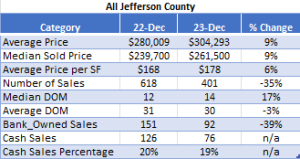
Market Performance Highlights
Average and Median Sold Prices: We’ve witnessed a solid increase in property values with both average and median sold prices swelling by an upbeat 9%.
Price per Square Foot: The details matter, as we’ve seen with the average price per square foot stepping up by 6%. A partial contributor is the increase in home values.
Sales Dynamics
Number of Sales: Here’s where the plot thickens. The number of sales in Louisville, KY has taken a 35% dip. This has definitely caused alarm bells to ring. Is this a sign of a stabilizing market or perhaps a momentary dip in the ever-flowing river of real estate? Only 2024 will tell.
Days on Market (DOM): Properties have been taking a slight detour, with the median DOM increasing by 17%. It’s a modest nudge, suggesting that while homes are still moving, buyers are taking that extra moment to make their decisions.
Specific Trends
Bank-Owned Sales: Bank-owned sales have seen a significant drop of 39%. This could be a beacon of a strengthening economy or a shift in the bank’s approach to property sales.
Cash Sales: While the total number of cash sales has decreased, the percentage of cash transactions has held steady, indicating a consistent segment of the market that prefers the clink of coins over the rustle of banknotes.
Smaller Market Areas within Jefferson County
Diving into the local flavors of Jefferson County, let’s take a closer look at how specific areas have fared, comparing them to the broader strokes of the county canvas.
Valley Station – A Snapshot
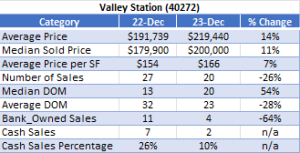
Average Price: The average price in Valley Station saw an impressive leap of 14%, outpacing the county’s overall growth.
Median DOM: Homes in Valley Station have been lingering a little longer on the market, with a notable 54% rise in the median DOM. It’s a curious trend that warrants a watchful eye.
St Matthews – The Upswing
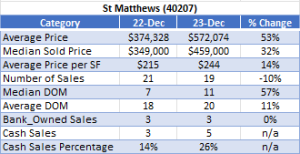
Average Price: St Matthews stands out with a whopping 53% surge in average prices, and a 32% increase in median prices. It’s a huge signal that this area is highly sought after, and properties here are being valued more than ever.
The Highlands – The Mixed Bag
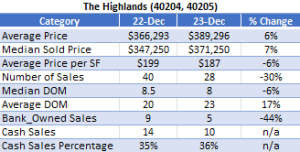
Average Price: The Highlands reported a 6% growth in average prices, a more tempered pace compared to its neighbors.
Sales and DOM: However, the number of sales has seen a drop of 30%, and the average DOM has experienced a rise. These statistics paint a picture of a more selective market.
Middletown – The Highlight of Today’s Show
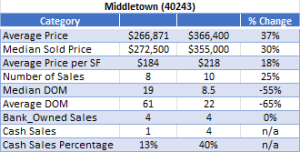
Middletown deserves a drumroll with a 37% hike in average prices and a 30% rise in median sold prices. But the real headline here is the dramatic drop in both median and average DOM—a clear sign that Middletown is where the action is. Properties here are not just selling; they’re selling fast.
Middletown Market Analysis – The Last 180 Days
As we focus our lenses closer on Middletown, I have a collection of graphs that give us a snapshot of the real estate dynamics over the past 180 days. From concessions to lot sizes, and days on the market, I’ve got the insights to share. Let’s dive in.
1. Concessions by Price: The trend here indicates that seller concessions are relatively rare and mostly low, even as sale prices vary. This suggests a strong seller’s market in Middletown.
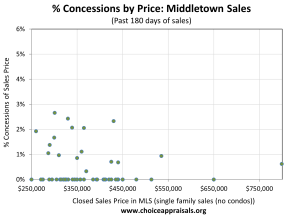
2. Concessions Dollar Amount: Higher-priced homes seem to see larger concessions in absolute dollar terms, yet these remain a small fraction of the overall sale price.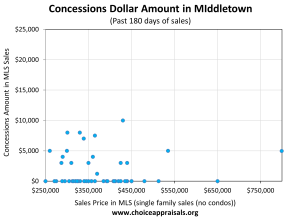
3. Concessions vs Days on Market: There does not seem to be much of an increase in concessions as the days on market increase.
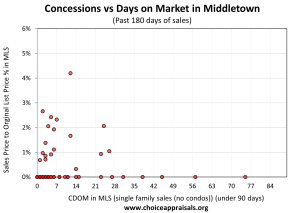
4. Days on Market vs Final Price: The graph depicts a mixed market in Middletown, where homes with shorter days on market often sell close to the list price, yet there are notable concessions even among these quick sales, indicating nuanced buyer-seller negotiations.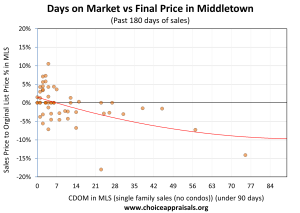
5. Price vs Lot Size: Larger lots tend to fetch higher prices, but there’s a wide range in sale prices across similar lot sizes, indicating that factors beyond just space are at play in pricing.
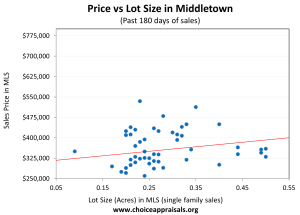
6. Price vs Square Footage: A clear correlation is seen between larger homes and higher sale prices, though the relationship is not strictly linear.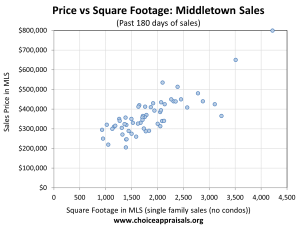
7. Price per Square Foot vs Bedroom Count: As expected, more bedrooms generally mean a higher price per square foot, yet there are outliers, suggesting that Middletown buyers value quality and features alongside size.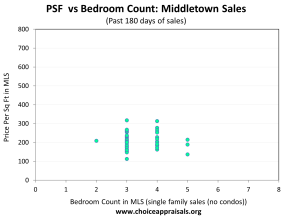
8. Sales Price Compared to Original Price (Dollar Amount): Most sales hover around the original list price. However, some are under the list .price, illustrating room for negotiation.
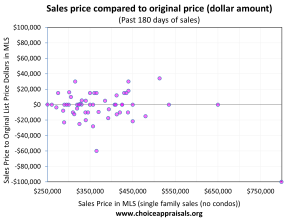 9. Sales Price Compared to Original Price (Percentage): A similar trend as above, with sale prices closely aligned with list prices, affirming a market with a little room for price negotiation (but clearly not a lot).
9. Sales Price Compared to Original Price (Percentage): A similar trend as above, with sale prices closely aligned with list prices, affirming a market with a little room for price negotiation (but clearly not a lot).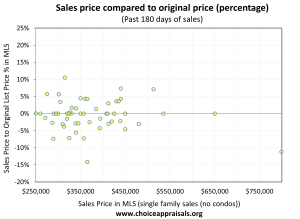
Market Summary
In sum, Middletown’s real estate landscape over the past 180 days is characterized by strong seller confidence, evidenced by minimal concessions and sales prices that closely align with list prices Lot size and living space do influence sale prices, but they’re not the only factors.
Hopefully you’ll agree that this glimpse into Middletown not only sheds light on current trends but also arms you with the knowledge to better forecast, strategize, and navigate the local market with finesse.
A Cozy Wrap-Up
And just like that, our stroll through the real estate landscape of Jefferson County and the neighborhood of Middletown comes to a close. Hopefully, you’ve found a few gems that sparkled with possibility, as you discuss the market with your clients. If we compare today’s market to a fireplace, remember that these insights are the embers that keep your strategies warm and your decisions illuminated. If the figures and trends have piqued your interest and you or someone you know would benefit from a data-driven appraisal report, don’t hesitate to reach out.
Now, as we part ways on this virtual stroll, consider this an open invitation to connect and explore the realms of possibility together. Whether buying or selling, let’s make your next real estate endeavor not just a transaction, but a triumph.
by Conrad Meertins | Sep 11, 2023 | Uncategorized

The Tale of the “Larger” Home

Let me take you back to a property I once appraised. The MLS Listing advertised the home as a cozy 1,300 square feet. However, upon measurement, it was only a 1,000-square-foot dwelling. Sure, the market was on an upswing, and the list price fortunately equated to the market value, but what if the market had been stagnant or declining?
The discrepancy could have had serious repercussions. The potential buyers were under the illusion that they were getting a larger home. Realtors, let this be a cautionary tale. Accurate measurements are not just optional; they are critical. Let’s dive in.
The ANSI Standard: A New Measure of Accountability

As of 2022, appraisers are mandated to follow the ANSI® Z765-2021 standard, also known as the ANSI standard, for measuring homes. This standard covers everything from the gross living area to non-gross living areas like basements and additional structures. Fannie Mae’s selling guidelines are crystal clear: if your appraisals require interior and exterior inspections, you must adhere to this standard. Failure to do so renders the appraisal unacceptable.
Why is this important for realtors? Because it sets a standardized framework that you should also be following. If appraisers have to be this meticulous, why shouldn’t you? This leads me to my next point.
Taking Action: Measure Twice, List Once

If you find yourself in doubt, don’t hesitate to get your listing measured. I offer this service and am more than happy to assist. However, it’s not just about outsourcing; you can also take matters into your own hands. Measuring a home isn’t rocket science, but it does require careful attention to detail.
Here are some tools you might consider to ensure accurate measurements:
– Laser Distance Measurer: For quick and precise measurements.
– CubiCasa – a digital resource to create floor plans
– A Clipboard and Graph Paper: The old-fashioned but effective way to jot down measurements as you go.
Conclusion: The True Value of Accuracy
Remember, when a buyer or seller is looking at a home, they are envisioning a future, a lifestyle. Your listing sets the stage for that vision. An inaccurate listing not only disrupts that vision but could potentially lead to legal complications. In this ever-evolving industry, staying ahead means adapting to changes and upholding high standards of accuracy and integrity.
As the old adage goes, “Measure twice, cut once.” In our world, it’s more like, “Measure twice, list once.” May we all strive for this level of diligence in our practice.
by Conrad Meertins | Aug 28, 2023 | Uncategorized

Welcome to the fascinating world of real estate! Ever wondered how a property’s worth is decided? There’s a method called the Sales Comparison Approach (SCA). This short article will help you understand what it is and how it’s used. Plus, we’ll discuss the steps involved, and its advantages and limitations. So, let’s jump in!

Understanding the Sales Comparison Approach
The Sales Comparison Approach is a way to determine a property’s value. It’s widely used in real estate because it compares the property to similar ones that have recently been sold. This way, the value is based on what buyers are actually willing to pay.

Steps Involved in the Sales Comparison Approach
Now, how does it work? A major key for the appraiser is to determine the pool of similar properties, called “comparables.” In an ideal world, these homes would have sold within the past 3 to 6 months. However, appraisers can go back in time as far as necessary. After selecting 3 to 6 comparables to serve as representatives, they make adjustments where appropriate.
For example, if your house has a new roof but the comparable doesn’t, they’ll add the “contributory value” of a new roof to the comparable’s price. Contributory value is essentially “how much more the average person will pay because of that feature.” By making this adjustment to the comparable sale, the price reflects what it would be if it had a new roof, like your house!

The Use of the Sales Comparison Approach in Various Property Types
SCA can be used for different types of properties. Whether it’s a condo in the city, a house in the suburbs, or a farmhouse in the country, SCA can be helpful. However, each type of property has its own considerations. For instance, a farmhouse’s value might be influenced more by its land size than a city condo, which has no land.

Advantages and Limitations of the Sales Comparison Approach
The best thing about SCA is that it’s based on real sales, giving a realistic value. But it’s not perfect. Sometimes it’s hard to find comparables, and no two properties are the same, so making adjustments isn’t always straightforward. But don’t worry! Skilled appraisers know how to handle these challenges.
Conclusion
So, there you have it! The Sales Comparison Approach is a key part of real estate appraisals. It’s useful but also has its challenges. By understanding it, you’re now better equipped to deal with property valuations. For more insights into real estate, consider joining our Facebook group. It’s a great place to learn and ask questions. Happy appraising!
by Conrad Meertins | Oct 12, 2022 | Uncategorized

Everyone wants a “turn-key” home these days. That means once they turn the key and open the front door, the house is “ready to use” with no repairs needed.
If you’re thinking of selling your parent’s home, you may not be able to make it turn-key. But no doubt you would like to make it more marketable. I say, go for it! I am an advocate of getting as much as you can for your home. One thing you don’t want to do is spend money on the wrong updates. Why is that?
Your goal is to update your home to get a higher appraised value. But sometimes the updates you make can have the opposite effect. Here are the three worst renovations:
1) High-end appliances or adding more living area
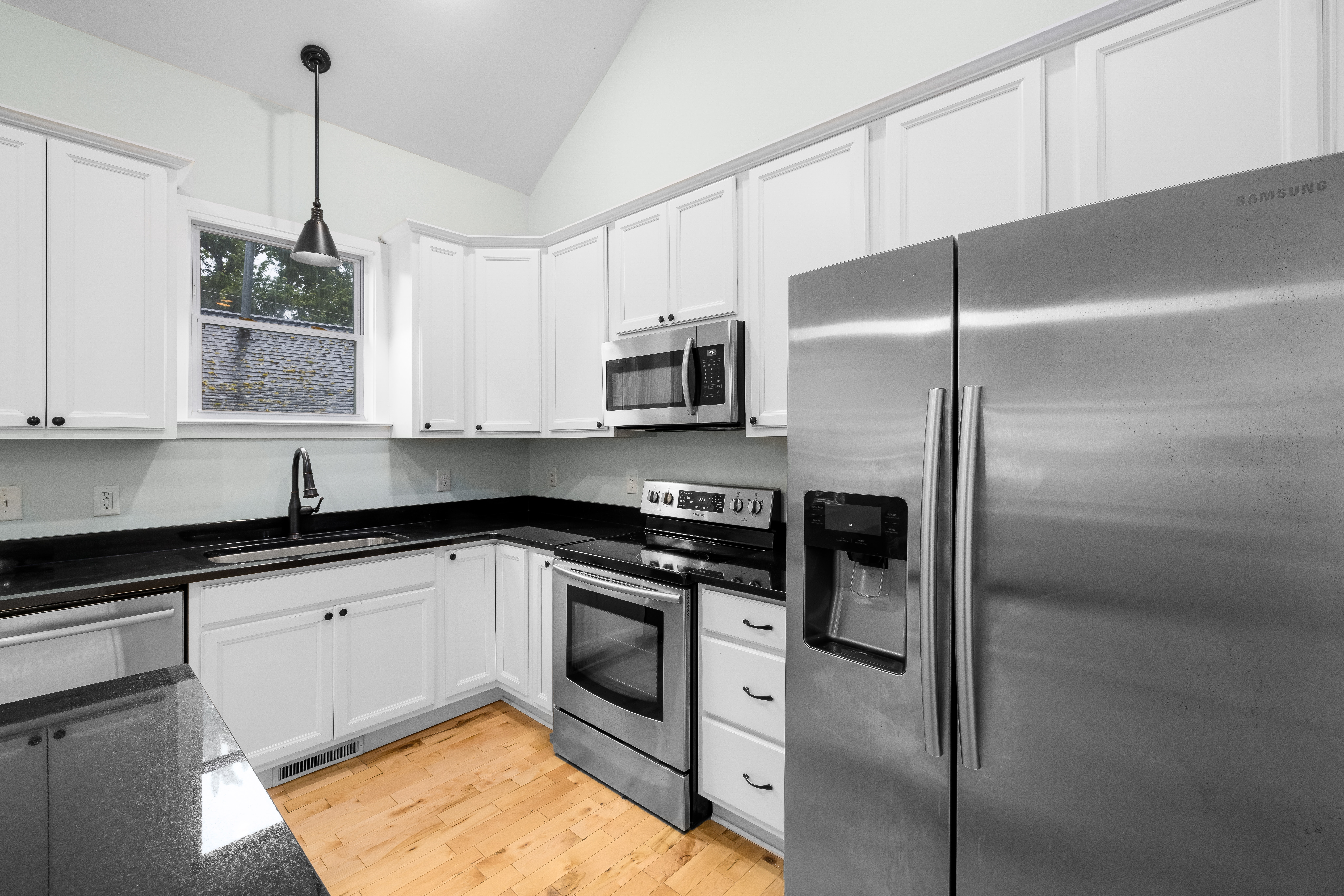


Such updates may not increase the value of your home if these are uncommon in your neighborhood.
Buyers aren’t going to spend thousands of dollars more for “bigger and better” features if the average sale price for homes in the area is lower.
2) Specialized /personalized features

Over-personalized improvements may not appeal to potential buyers. You may be a UK fan, but the UK tiling on the bathroom floor may not appeal to the UofL buyer that is considering your home. Try to keep the updates neutral since buyers won’t pay more for homes with several features they will need to remove or replace.
3) DIY projects

When it comes to remodels or repairs, it is best to invest in hiring a professional to do the job. Unless, of course, you have the home improvement skills to pay the bills.
There’s no doubt that do-it-yourself improvements can save you money initially. But, there is a risk of compromising the condition of the project, and in turn, decreasing the home value.
Key takeaways…
Some key takeaways when thinking of updating your parent’s home are:
1. consider your market – is the update you are considering common and/or in-demand in your area?
2. keep home improvements consistent with the rest of the home, and the rest of the neighborhood.
3. use a professional to do the work, this way the quality of the update is not compromised.
Also, It is also a good idea to consult a real estate appraiser to determine which improvements will get you the best value for your home.
To learn what your home would be worth after making certain repairs, give me a call, I’d be happy to help.
by Conrad Meertins | Jan 23, 2020 | Uncategorized

When you get your appraisal report it may sometimes be twenty to thirty pages in length. This may be overwhelming to digest. This article will let you know what are some important elements of your report.
Most appraisal reports will consist of the same main parts: basic property information, comparable sales information, and value conclusion.
Here is a guide where how these three items are often laid out in the appraisal report:
A Description of the property (land and the improvements on the land)

The beginning of the report will typically contain the property’s basic information. The address, property tax, the type of property, the size of the land, any updated or renovations done, and other general information. It is important that the information in this part is all correct to ensure that the appraiser can find and compare it to similar homes to come up with an accurate value.
Pro Tip – If you are the homeowner ordering the appraiser to help you determine the market value in order to sell the property, then this information is already known. Therefore, this section may not need to be as extensive.
Comparables

The next prominent section of the appraisal is where you can find the homes that the appraiser used to compare to your property, and their corresponding sales prices. Here you may also notice adjustments in the comparables values. These are made in order to estimate the market value of your home. The appraiser should be able to show the bases for these adjustments.
Value

At the bottom of the page featuring comparable sales is one of the most important parts of the appraisal for you, the client, your home’s value. To better understand HOW the appraiser arrived at this number, look for the reconciliation or the summary conclusion section.
This is by no means an exhaustive list of what is included in an appraisal report. However, now that you have an idea of three important sections (property description, comparables analysis and value conclusion/reconciliation, keep in mind that you should carefully read it and check if there are any errors, missing information, and whether or not you feel that the final value is correctly justified. A good appraiser will not be concerned if you call to ask a question or two about his conclusions.
Download the eBook to see where you can find these important sections in the appraisal report.
by Conrad Meertins | Dec 16, 2019 | Uncategorized

You know you need an appraiser to value your home, but when you look online, there are so many to choose from! Sure price may be a factor, but simply going for the cheapest appraiser may likely lead to disaster! But what else do you ask the appraiser when you give him or her a call????
This blog post will guide you through that process….
It is important to choose the right appraiser to value your property because it will save you a lot of time, money, and energy. In order to determine the best appraiser for you home, here are some categories of questions you can ask before you hire:
‘Basic information’ Questions
You should get to know the appraiser you are going to work with. You may ask if they work alone or with a company, if they work full time as an appraiser, how many appraisals they usually do in a day, or a week. Also get their contact information and when is a good time, you can reach them. This can make communication easier especially when you might need to ask questions or provide information about anything concerning the appraisal.
Licensure Questions
Ask if they are licensed or certified, and if they have other professional designations or are continuing any education – This would let you know if the appraiser is qualified to do the job and also what types of properties they are permitted to appraise. Certified appraisers will have completed more basic education and will generally have a greater depth of experience compared to licensed appraisers.
 Experience Questions
Experience Questions
How long have they been appraising property? Are there specific types of properties they appraise? – The appraiser’s experience and knowledge in the field are very important things to consider. It is recommended that the appraiser you hire has at least 5 years of experience for simple properties and at least 10 years for more complex ones. You would also want to know their experience in appraising homes similar to yours, especially if your home has some special features.
Time-frame Questions
Ask when the report will be ready – This will ensure when you can expect the report to be ready. It is important to establish a date to avoid delays to the whole process of buying or selling a home.
And perhaps the all time favorite…
 Money Questions
Money Questions
Ask what is their fee and the basis of what they charge – it is advised that you do not hire an appraiser that charges a percentage of the appraised value. This indicates a bias in the home’s value. Appraisal fees vary depending on your location so researching the usual cost for your area and type of home will help give you an idea of the range.
It goes without saying that you need to be able to know and trust the professional who will have access to your home and accurately determine its value. Being ready with questions of the main things you need to know about the appraiser will ultimately help you to select the right person for the Job.
by Conrad Meertins | Sep 3, 2019 | Uncategorized

You just took a sledge hammer to the wall of your tiny kitchen which has been confining you for years!!! AHH! The feeling of liberation! Your kitchen expansion project is underway! Wait a second…you need some cash to finish the project, so you decide to refinance. But does the project need to be complete before the bank will lend the money?
Unfortunately, I can’t answer for the bank. However, I can let you know some appraisal terms that come into play. “as-is” value and “subject to” value.
What do “as-is” and “subject-to” values mean?
• “As-is” value – An estimate of the market value of a home in its current condition, use, and zoning.
• “Subject to” value – This is what the value will be whenever certain conditions are met. It is determined by taking into consideration the proposed improvements.
If the as-is value (broken wall and all!) is acceptable to the bank, they may lend! However, there is one caveat…The appraisal report must identify and describe physical deficiencies that could affect a property’s safety, soundness, or structural integrity. If the appraiser has identified any of these deficiencies, the property must be appraised “subject to” completion of the specific repairs or alterations.
Two major take aways: 1) how much has your home value dipped considering your property in its current stage of renovation and 2) does the current stage of renovation represent a health and safety risk!
by Conrad Meertins | Aug 15, 2019 | Uncategorized
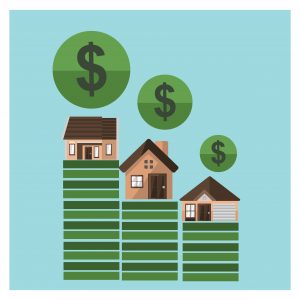
In the context of selling your home or buying a home, what exactly is market value? This sounds like a really simple question. Someone might respond, “market value is the price that someone is willing to pay for a home”. However, there are other factors that must be taken into consideration.
Here is a definition from the Fannie Mae Selling Guide (This definition is also stated in most appraisal reports related to mortgages)
Definition
Market value is the most probable price that a property should bring in a competitive and open market under all conditions requisite to a fair sale, the buyer and seller, each acting prudently, knowledgeably and assuming the price is not affected by undue stimulus.
Implicit in this definition is the consummation of a sale as of a specified date and the passing of title from seller to buyer under conditions whereby:
- buyer and seller are typically motivated; both parties are well informed or well advised;
- each acting in what he or she considers his/her own best interest;
- a reasonable time is allowed for exposure in the open market;
- payment is made in terms of cash in U.S. dollars or in terms of financial arrangements comparable thereto;
- the price represents the normal consideration for the property sold unaffected by special or creative financing or sales concessions granted by anyone associated with the sale.
One main take away is that for it to be said that a home was sold at “market value” five conditions have to be met.
Real world application of this point
If a home’s prior sale price was not market value then an appraiser should not use that prior sale as a comparable.














































